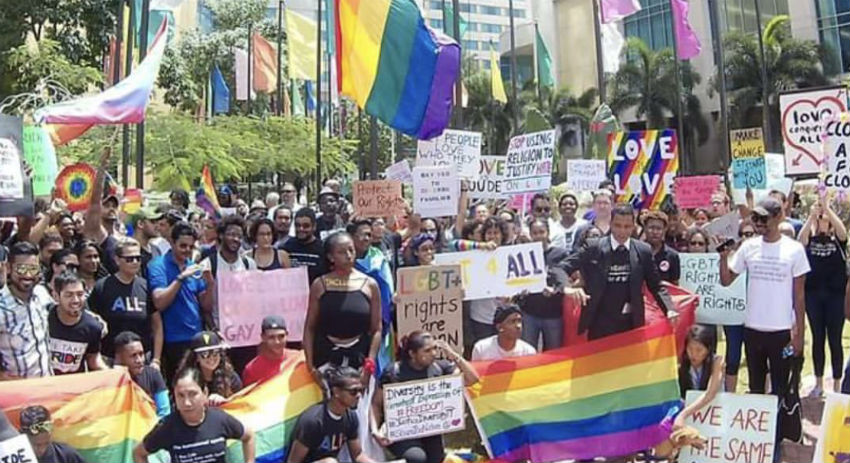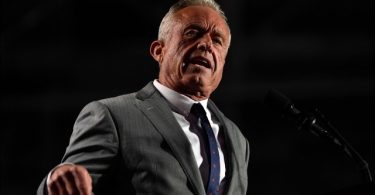The decision to strike down the ban on gay sex by the Supreme Court in India is monumental. With a population of over 1.3 billion, the law change impacts upon the lives of millions. Approximately one sixth of the world’s population lives in the country.
However, in many countries, gay sex remains illegal. Homosexual activity can still result in prosecution in 71 countries.
In over half a dozen countries, those found guilty can even face the death penalty. These include Iran, Sudan, Saudi Arabia, Yemen, parts Somalia and northern Nigeria. Members of Islamic State have also put people to death for being gay in Iran and Syria.
The situation for LGBTI people in many of these countries remains dire. Elsewhere, advocates are making progress.
Below are five countries which could follow India’s example.
Trinidad and Tobago
This is basically a done deal. On 12 April, a court in Trinidad and Tobago (population 1.4million) ruled that parts of the country’s sexual offenses act which criminalized ‘buggery’ and ‘serious indecency’ between two men were unconstitutional.
In effect, Judge Devindra Rampersad’s ruling meant the ban on gay sex was wrong and the law must change.
Campaigners for legislative change and LGBTI advocates were jubilant. A final ruling is due on 20 September, and for now, the law is suspended.
The court ruling was made after a case was filed by Trinidad-born LGBTI activist Jason Jones. He filed to have both Section 13 and Section 16 of the Sexual Offences Act declared null and void.
Pro-LGBTI campaigners in Trinidad and Tobago, April 2018 (Photo: @trinijayjay | Instagram)
The significance of the court decision extended far beyond Trinidad and Tobago. Advocates in other Caribbean countries are hopeful their nations may follow suit.
This includes Antigua and Barbuda, Barbados, Dominica, Grenada, Jamaica, Saint Kitts and Nevis, Saint Lucia, Saint Vincent and the Grenadines, plus Mauritius in the Indian Ocean.
Advocates expect the law to change this month. Jones tells GSN some time will elapse to allow current cases to pass through the justice system, ‘where the buggery laws have been used in instances of anal rape. And then the law will be struck down. After that, any cases or rape will go through the normal rape laws.
‘One of the overbearing arguments for retaining buggery laws is anal rape, but this is a cop-out,’ says Jones. ‘If you need to update your sexual offences act, update them. Don’t keep a law on buggery that also criminalizes law-abiding citizens.’
Jones points to the example of Mozambique. It recently updated its sexual offenses law but dropped its British Colonial era buggery law.
‘They just left it out,’ says Jones. ‘There are many ways to move forward. It doesn’t have to be an act of Parliament. It can just be a measure of updating a country’s sexual offences act.’
After the court Trinidad and Tobago issues its ruling, the country’s Attorney General appeals the victory to the privy Council in London, UK. This is of great significance. The privy Council acts as a Supreme Court for a number of former colonies of Britain, similar to the Supreme Court in the US or India.
‘For many former British colonies we’re too small to have our own Supreme Court, so we rely on the privy Council. The privy council take 3-5 years to make a ruling.’
That ruling could have an impact on at least the ten other Commonwealth Countries mentioned above.
In addition, it opens up a way for potentially similar legal challenges in the 36 other countries in the Commonwealth where gay sex remains illegal.
Jamaica
Although the privy council ruling mentioned above may impact on Jamaica, the island nation is worthy of particular attention. Many consider Jamaica (population 2.8million) one of the most homophobic countries in the world, and local LGBTI communities face persecution and discrimination.
Three main pieces of legislation prohibit same-sex sexual activity: Sections 76, 77 and 79 of the The Offences Against the Person Act, which prohibit buggery and gross indecency between men.
Section 80 of the act also allows police to arrest anyone loitering at night who they suspect may be about to engage in any of the prohibited acts. It’s a vague clause police use to arrest anyone they suspect may be gay. Local newspapers often name men arrested and many LGBTI fear blackmail by neighbors if their sexuality becomes known.
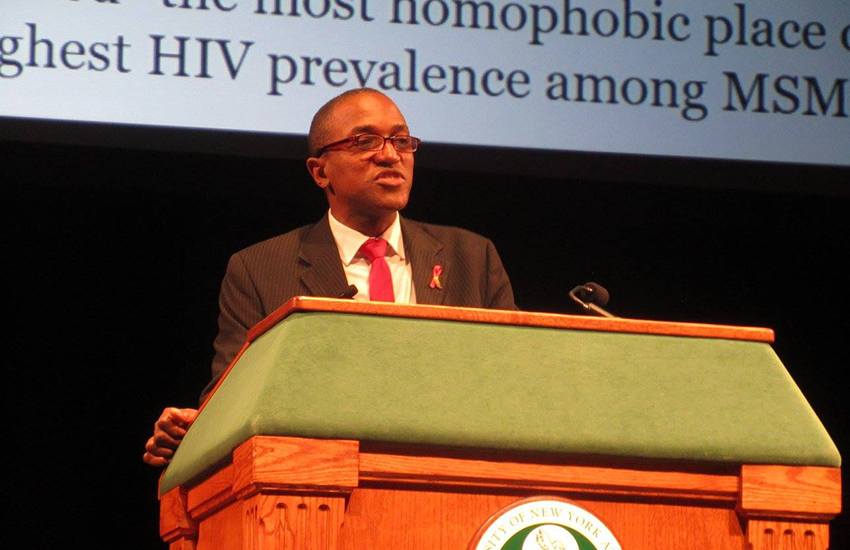
Maurice Tomlinson is fighting for LGBTI equality in Jamaica
A case is currently passing through the courts challenging the Jamaica law. Maurice Tomlinson, a Jamaican now based in Canada, says Jamaica’s anti-sodomy law is unconstitutional.
‘The case in Jamaica is currently stalled as we wait on the Court of Appeal to decide if the Public Defender can be allowed in the matter as an interested party to support my claim,’ Tomlinson told GSN.
‘The court below allowed ten religious groups in as interested parties but denied the Public Defender and so she appealed. Although the appeal was fully heard last year we have no idea when the judgment will be decided.’
The current Jamaican Government holds on to power by a slim majority. Given the country’s political climate and the very strong anti-LGBTI sentiment among citizens, Tomlinson says the chances of Parliament acting to repeal the gay sex laws are slim.
‘Parliament has had many opportunities to do so, and there is in fact a review of the Sexual Offences Act currently ongoing with a report outstanding from November 2017. However, the powerful anti-gay churches that control significant voting blocs have threatened to punish any Parliamentarian who supports decriminalization.
‘So, we will have to wait on the courts, which are hopelessly backlogged.
‘The Trinidad decision will indeed be very persuasive for the Jamaican anti-sodomy law challenge, however our unique constitutional arrangement will require a fresh look at the law by our courts.
A spokesperson for local LGBTI group J-FLAG also believes it’s impossible to say whether law change might come soon.
‘The Trinidadian case will be instructive if it arrives to the level of the privy council as are all judgements made by that Court. However, the likelihood of the outcomes of such a process are too distant to comment. The Trinidad & Tobago Court of Appeal will have to make its decision first.’
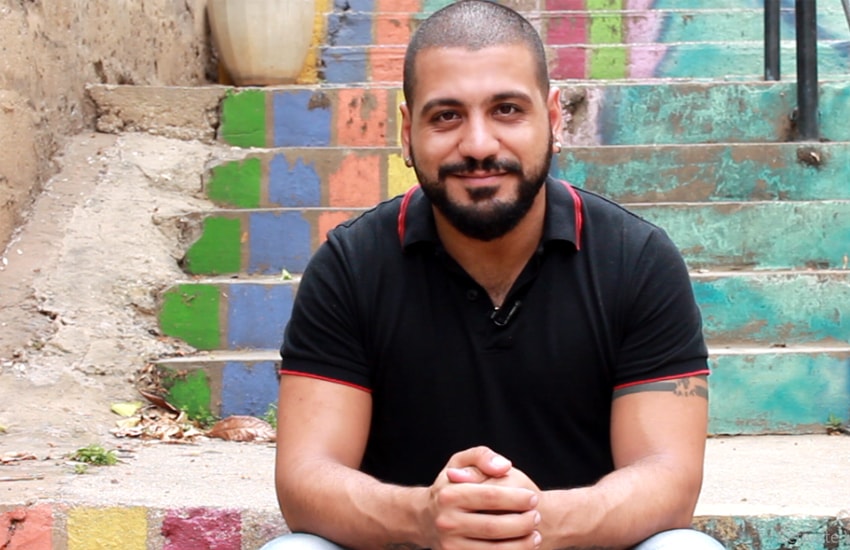
A campaign video released ahead of elections earlier this year featured LGBTI people calling for change in Lebanon (Photo: Arab Foundation For Freedoms and Equality)
Lebanon
In the Middle East, Israel stands alone in its legalization of same-sex sexual activity. However, there’s a chance Lebanon (population 6million) may follow suit. Same-sex sexual activity is illegal under Penal Code 534. However, the code, which bans ‘unnatural sex’, has rarely been enacted in the past ten years. LGBTI citizens are beginning to live more open lives.
In 2017, a small, arts-based Beirut Pride festival took place, although its organizer was arrested during this year’s event.
Ahead of the country’s recent Parliamentarian elections in May, many candidates for the fledgling, anti-corruption Kelna Beirut party called for the repeal of Penal Code 534. Although none were successful in their bid for election, the fact it’s even being discussed is positive.
In July, a Lebanese appeals court ruled same-sex conduct is not illegal under article 534 of the penal code, and that homosexuality is not unnatural. It said homosexual sex should not be criminalized unless it occurs in public or with a minor. Although the ruling doesn’t change the law, it was welcomed by advocates as another step in the right direction.
Bassam Khawaja, Lebanon researcher at Human Rights Watch, told Gay Star News.
‘This is a significant step in the right direction … We will continue to press parliament to fully repeal article 534, which punishes “any sexual intercourse contrary to the order of nature” with up to one year in prison. However, despite years of advocacy, parliament does not show any immediate sign of considering a repeal.
‘But in parliamentary elections this year, a major political party for the first time pledged to repeal the law as part of its elections platform, so we are starting to see some cracks in this wall.’
Tunisia
Gay sex risks a jail sentence of three years in the North African country of Tunisia. However, a committee formed last year by current President Béji Caïd Essebsi, recommended in June looks at a law change.
In a wider report on recommended law reforms, the Individual Freedoms and Equality Committee (COLIBE) recommended to Essebi the scrapping of Article 230 of the Penal Code, which criminalizes gay sex. It said if Article 230 is not removed, the punishment should at least be lowered, from a potential prison sentence to a fine of 500 dinars (US$200).
Human Rights Watch’s Neela Ghoshal specializes in LGBTI research in Africa. She said the report’s recommendations on homosexuality were a big deal.
‘(They) may not result in immediate change, but provides fuel for the dynamic LGBT rights movement in Tunisia,’ she wrote on Twitter.
All Out is currently running a petition to bring international pressure on President Essebsi to scrap Article 230. However, a spokesperson for local LGBTI rights organization, Shams, tells GSN it is not looking likely the President will act.
‘We are not optimistic about the abolition of article 230 of the Tunisian Penal Code.’
They think the chances of reducing the punishment is ‘possible’. However, many in society still regard homosexuality as a ‘perversity.’
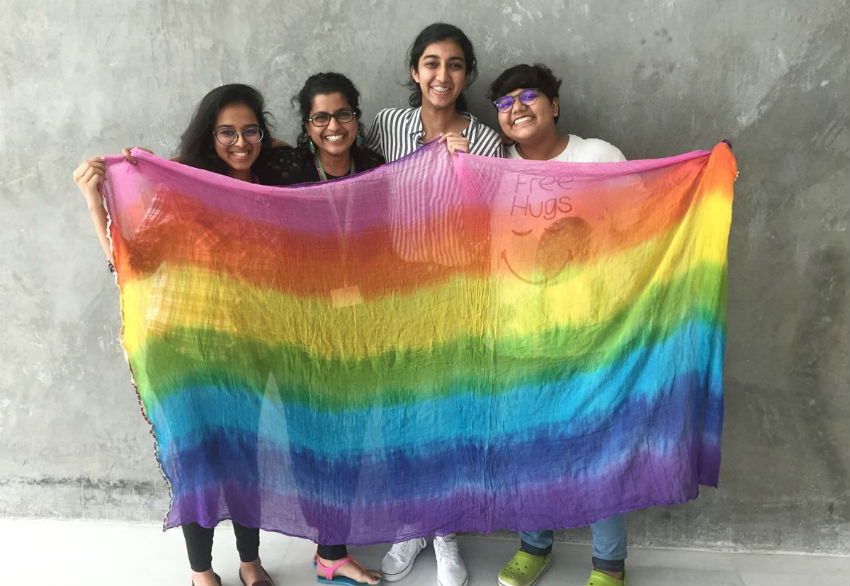
Workers at India Culture Lab celebrate the Indian Supreme Court ruling, 6 September 2018 (Photo: @IndiaCultureLab via Twitter)
Kenya
Same-sex sexual activity is legal in 21 African states and illegal in 33.
Campaigners in Kenya (population 48million) are currently engaged in a legal challenge to Kenya’s colonial era laws prohibiting any sex that doesn’t involve penis-vagina penetration. Currently, anyone found guilty of homosexual activity in the East African country can face up to 14 years in jail.
The National Gay and Lesbian Human Rights Commission launched a legal challenge earlier this year. It points out the Kenya constitution states: ‘Every person is equal before the law and has the right to equal protection and equal benefit of the law.’
It argues Section 162, which makes sodomy illegal, is unconstitutional. Furthermore, Section 165 refers to sexual activity between men as ‘gross indecency’ and can lead to five years imprisonment.
However, Kenya remains a deeply homophobic and transphobic country. It is by no means certain the court will overturn the gay sex ban.
A spokesperson for the Gay and Lesbian Coalition of Kenya said law change won’t just impact on gay people.
‘For clarity, these are not sodomy laws. It is not clear what they are because as they read, they refer to any type of sex that, pardon my crudeness, does not include a penis penetrating a vagina.
‘These sexual acts include oral sex, the use of toys, anal sex and masturbation. While these laws often are applied on gay men and women, the reality is even straight couples have oral sex, toys, engage in anal sex, masturbation, among other things, so this law applies to them as well.’
‘At this time, the case is still pending. A ruling has not been made and it is not clear when it will.’
See also
LGBTI radio station launched in Arab world prompts death threats
Lebanon LGBTI advocates appeal to citizens abroad to vote for change

